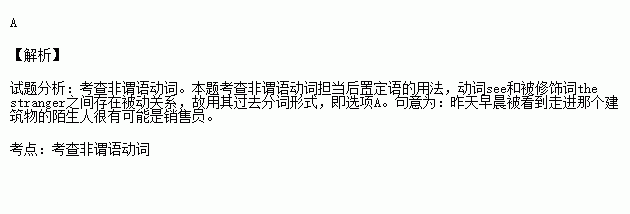题目内容
The stranger to walk into the building in the early morning was probably a salesman.
A. seen B. to see
C. to be seen D. seeing
Metropolitan North Georgia Water Planning District
2015 High School Video Contest
Here’s the Scoop on Pet Waste!
Submission Deadline March 27, 2015.
Eligibility Ninth, tenth, eleventh and twelfth grade students that attend schools located in Bartow, Cherokee, Clayton, Cobb, Coweta, DeKalb, Douglas, Fayette, Fulton, Forsyth, Gwinnett, Hall, Henry, Paulding and Rockdale counties are invited to participate in the video contest. Entries can be a team or individual effort. Guidelines Each video must be uploaded to YouTube. The video’s YouTube link must be included in the entry/release form. Team members must be from the same school. The video must be between 30-60 seconds in length. No professional assistance or use of copyright material is allowed, including background music. Each student participating in the contest or appearing in the video must fill out a form. For teams, submit an entry/release form for each team member. One video per team or individual. All entry/release forms must be postmarked or received by Friday, March 27, 2015. Email: kvaIlianos@atlantaregional.com OR Mail: 2015 Water Video Contest Metro Water District 40 Courtland Street, NE Atlanta, GA 30303 | Judging Submissions will be judged based on the following criteria: incorporation of the “Here’s the Scoop on Pet Waste’’ message. Use the "Here's the Scoop on Pet Waste’’ messaging fact sheet for background information on the issue. Composition (length, technical construction, audio quality). Entertainment value. Accuracy of information. Creativity. Prizes 1st Place $1500 2nd Place $1000 3rd Place $500 50% of the prize money will go to the individual or team who submits the video and 50% to the high school they attend. Winners will be notified directly. |
Page 1 of 3 www.northgeorgiawater.org | |
1.What does the underlined word “Eligibility” probably mean?
A. Age. B. Qualification.
C. Location. D. Grade.
2.When entering the contest, ________.
A. one must ask his or her teacher to sign the entry form
B. winners can earn at least $750 as a prize
C. one can invite friends from other schools to act in the video
D. participants had better add some humor and fun to the video


